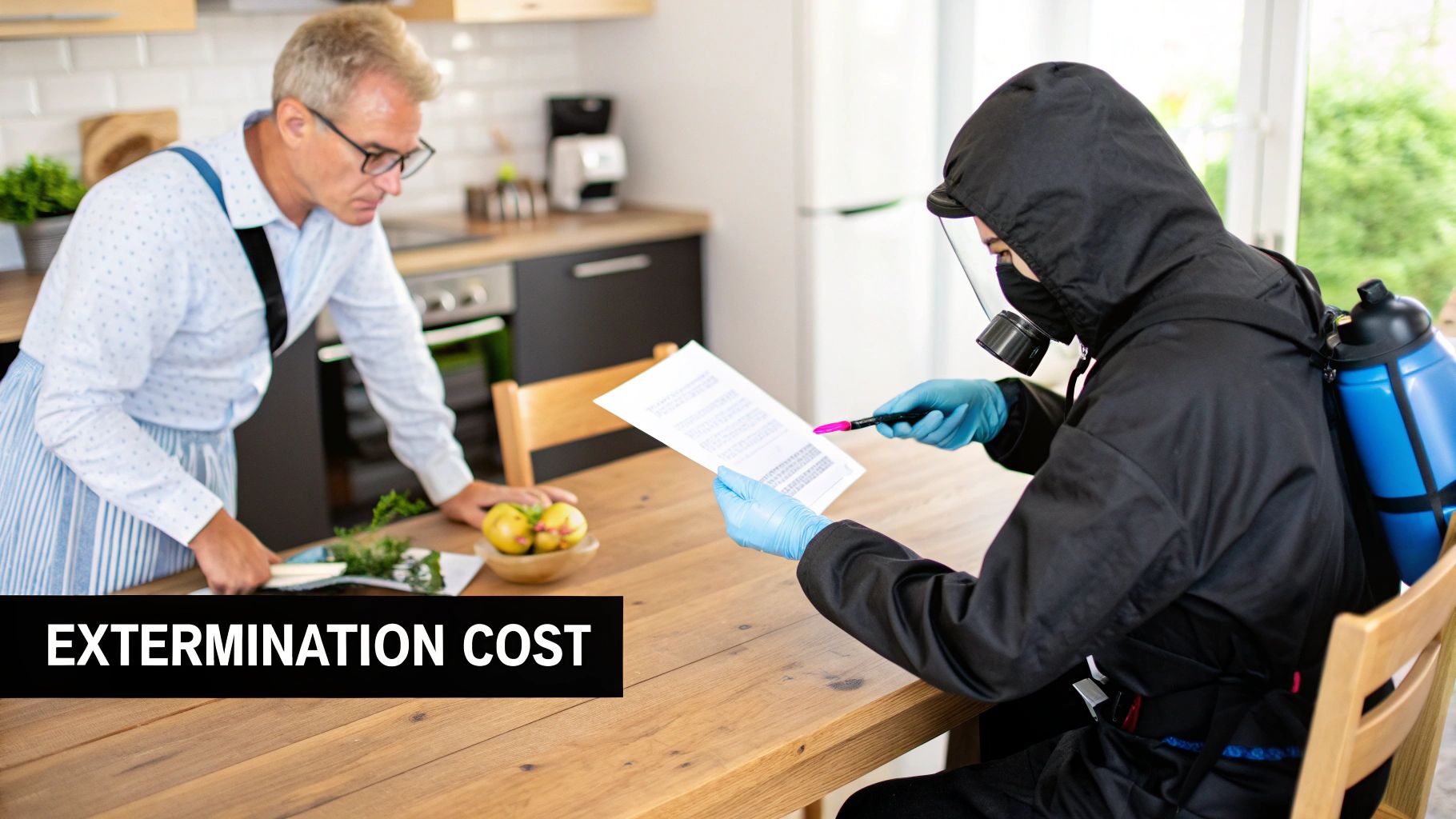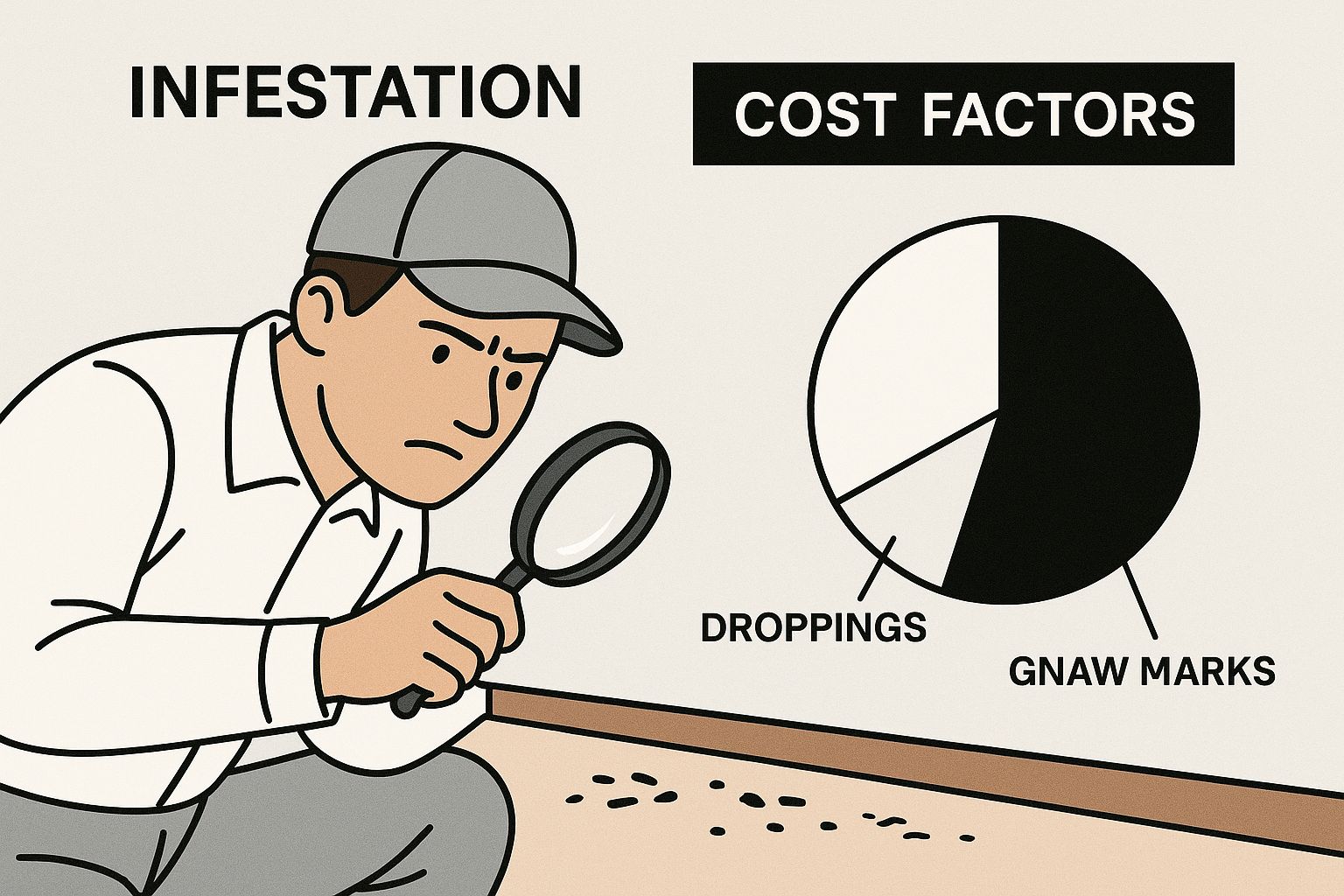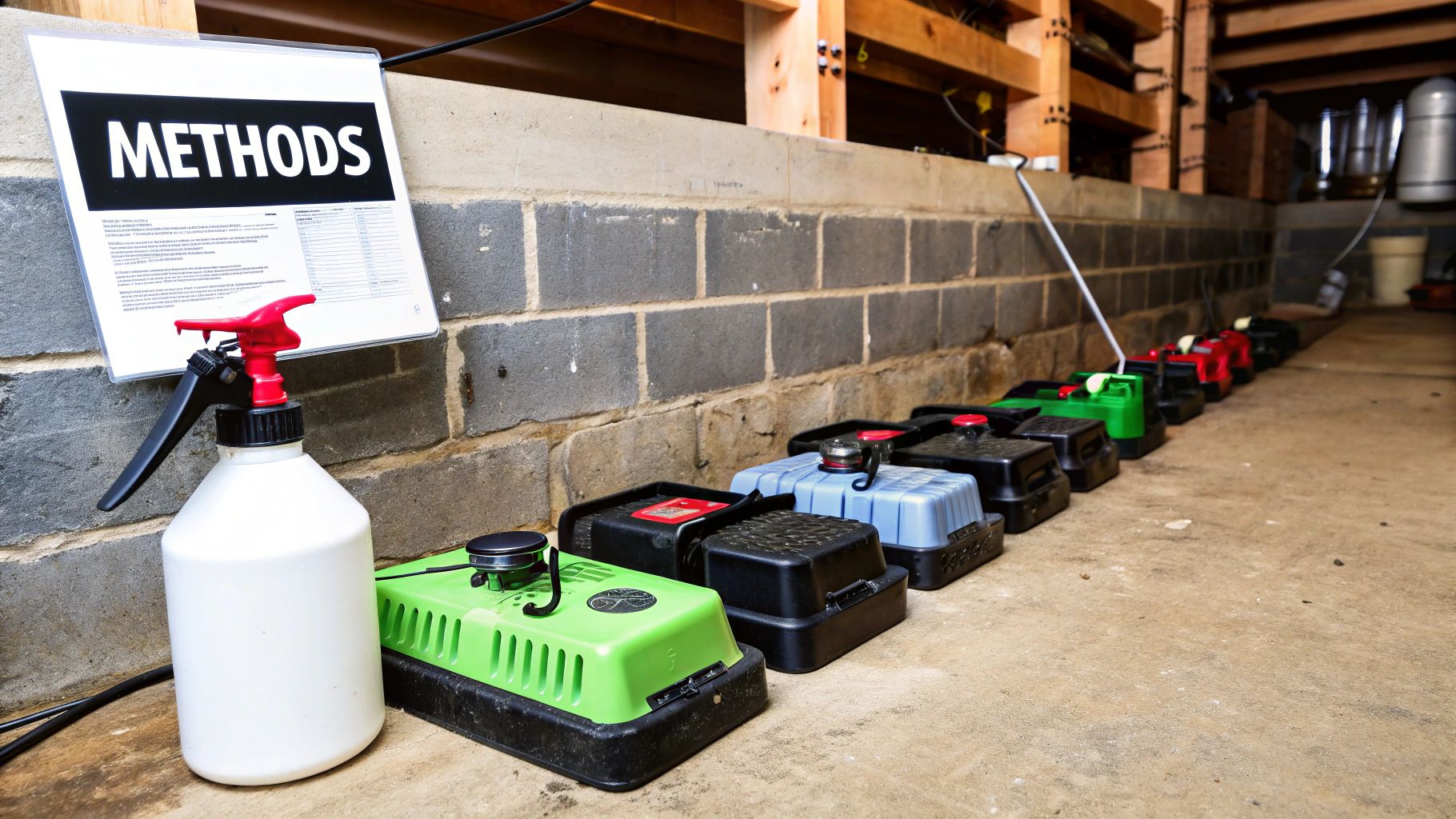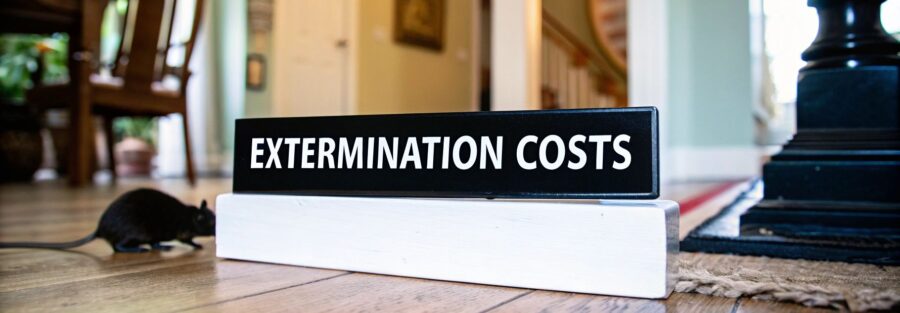When you find rats in your home, one of the first thoughts is usually, "How much is this going to cost me?" It’s a fair question, but there’s no simple, one-size-fits-all answer.
The average cost for professional rat extermination in the UK generally falls between £150 and £400. This usually covers a standard treatment plan for a typical home, which involves a few visits to get the job done properly. But remember, this is just a ballpark figure.
Understanding the Average Cost of Rat Extermination in the UK
Think of it like calling out a plumber. Fixing a leaky tap is a quick, straightforward job with a predictable price. But if that leak has caused water damage behind the walls, the job suddenly becomes a lot more complex and costly. It's the same with rats.
The final figure on your invoice isn't just a number plucked out of thin air. It’s a reflection of the time, the specialist materials, and the expertise needed to solve your specific rat problem for good. Tackling a single rat that's wandered into your garage is a very different beast to clearing out an established colony that's taken up residence in your loft or wall cavities.
Common Pricing Scenarios
To give you a clearer idea of what to expect, services are often structured around the complexity of the job. A cheap, one-off visit might sound appealing, but it rarely gets to the root of the problem. A proper treatment plan, while a bigger initial investment, is designed to provide a lasting solution.
Here’s a look at what you can typically expect to pay for professional rat control.
Estimated UK Rat Extermination Costs
This table breaks down the typical price ranges for professional rat extermination services for a standard residential property. It gives you a good idea of what to budget for depending on the scale of your problem.
| Service Level | Description | Estimated Cost Range (£) |
|---|---|---|
| Initial Assessment & Single Visit | A one-off visit to survey the issue and place initial traps or bait. Often insufficient for complete removal. | £90 – £150 |
| Standard Treatment Plan (2-3 Visits) | The most common option for residential homes. Includes an initial survey, treatment application, and one or two follow-up visits to ensure eradication. | £150 – £400 |
| Complex or Large-Scale Treatment | For severe infestations, large properties, or commercial buildings. Requires more extensive work, multiple visits, and potentially proofing measures. | £400+ |
It often helps to put these costs into perspective. When you think about what you might pay for other specialist help, like the average pricing for other essential services, you start to see the value in a professional solution that protects your home and health.
Of course, prices can vary depending on where you are in the country. For a more detailed look at what to expect in your local area, check out our guide to pest control prices near you.
Key Factors That Influence Your Final Bill

It can be confusing when you get a few different quotes for rat extermination. Why is one company charging so much more than another? The truth is, the final cost is rarely a simple, flat fee because every single infestation is different. Professionals have to weigh up several key variables before they can give you an accurate price.
Think of it like getting your car repaired. An oil change has a standard price, but if the mechanic finds a serious engine problem during the check-up, the job (and the bill) is going to change. Pest control works the same way. The initial quote is an estimate based on what we can see, but the real cost depends on how complex the problem actually is.
Once you understand these factors, you can make sense of your quotes and see why your situation might cost more or less than the average. It’s not about pulling numbers out of thin air; it’s about creating the right solution for the job.
The Scale of the Infestation
The biggest thing that drives the cost is, unsurprisingly, the severity of your rat problem. Dealing with a single rat that’s snuck into your kitchen is a world away from tackling an established colony with nests hidden all over your property.
- Small Infestation: If you’ve only seen one or two rats or found a few droppings, it’s likely a minor issue. This usually means fewer visits and less intensive treatment, which keeps the costs down.
- Established Colony: Hearing constant scratching, finding droppings everywhere, and noticing a strong, ammonia-like smell? Those are all signs of a much bigger population. This demands a more robust, multi-visit strategy, pushing the overall cost up.
An established rat colony can grow surprisingly fast. A single pair of rats can produce several litters a year, quickly turning a small problem into a major infestation that requires a more comprehensive and costly intervention.
Property Size and Layout
The size and complexity of your property also play a massive part in the final bill. A larger home simply means more ground for the exterminator to inspect, treat, and secure.
A technician can get through a small two-bedroom terraced house much faster than a sprawling farmhouse with multiple outbuildings. The layout is just as important. A simple, open-plan space is far easier to manage than a property full of crawl spaces, a cluttered loft, and hidden voids where rats can easily hide.
Accessibility of the Problem
Where the rats are getting comfortable has a direct impact on the labour involved. If they’re nesting in an easy-to-reach loft or under kitchen units, the exterminator can get to work placing traps and bait without much fuss.
But if the infestation is hidden away deep inside wall cavities, under floorboards, or in a hard-to-reach cellar, the job gets a lot more difficult. It might take more time, specialist equipment, or even minor disruptive works to get to the root of the problem—all of which will be reflected in the final exterminator rats cost. Effective treatment is more than just laying traps; it involves crucial steps like rodent control proofing to block entry points and stop them from coming back.
The UK's pest control sector has seen steady growth, with roughly 854 businesses operating in 2024—a 6.4% increase from last year. This competitive market means pricing can vary, but it often reflects the growing demand for proper, effective solutions.
Comparing Extermination Methods and Their Costs
Getting your head around the different ways a pest controller tackles a rat problem is the first step to understanding the final exterminator rats cost. Not all treatments are created equal, and the method they choose has a direct impact on your bill. Believe me, the cheapest option isn't always the best value in the long run.
Think of it like this: you can take a paracetamol for a headache, or you can see a specialist to figure out why you're getting headaches in the first place. Pest control is no different. A quick fix might get rid of the rats you can see right now, but a proper, strategic approach is what stops them from coming back again and again.
This infographic gives a great overview of the key things an exterminator looks at when sizing up an infestation.

As you can see, things like how bad the infestation is and the size of your property are just as important as the treatment itself when it comes to the final price.
Comparing Rat Extermination Methods
So, what are the actual methods a professional might use? Let's break down the common approaches, comparing their costs, effectiveness, and what you need to consider for each.
| Method | Typical Cost | Pros | Cons |
|---|---|---|---|
| Baiting & Trapping | £50 – £150 per visit | Relatively low initial cost. Directly targets and reduces the current rat population. | Reactive, not preventative. Requires multiple visits. Doesn't solve entry point issues. |
| Proofing | £150 – £400+ | Long-term solution. Physically blocks rats from entering. Very cost-effective over time. | Higher upfront cost due to labour. Doesn't remove rats already inside. |
| Integrated Pest Management (IPM) | £200 – £500+ (for initial setup) | The "gold standard". Comprehensive and sustainable. Combines proofing, trapping, and monitoring. Prevents future infestations. | The most expensive option initially. Requires a thorough and strategic approach. |
Each method has its place, but as you can see, a long-term solution often involves more than just setting down a few traps. The most effective strategies usually blend a couple of these techniques.
Traditional Baiting and Trapping
The methods most people are familiar with are bait stations and traps. These are often the first line of attack and work well for getting an existing rat problem under control.
- Bait Stations: These are secure, tamper-proof boxes that hold rodenticide, making them a safer choice if you have children or pets around. The cost is fairly low, but it means the technician will need to come back several times to check on them and top up the bait.
- Traps: Classic snap traps and live traps give you immediate results and confirm a catch. But their success really depends on the technician’s skill in figuring out where the rats are running.
While these methods absolutely have their place, they are purely reactive. They deal with the rats that are already in your home but do nothing to stop new ones from getting in.
The Rise of Integrated Pest Management
A far more modern and thorough approach is Integrated Pest Management (IPM). This isn't just a one-off treatment; it's a complete strategy that rolls monitoring, prevention, and control into one.
IPM is a holistic approach focused on long-term prevention. It aims to solve the problem sustainably by understanding the rat's behaviour and environment, rather than just relying on chemical treatments.
This method is all about the bigger picture. Why are rats choosing your property? How are they getting inside? An exterminator using IPM will focus heavily on proofing measures—like sealing holes in your brickwork or fitting guards over vents—to physically block rats from ever getting in.
Sure, the upfront cost of IPM can be higher because of the extra work involved in proofing. But it almost always works out cheaper in the long run by stopping future infestations before they can even start. If you want to dig deeper, you can explore the details of what is Integrated Pest Management and see why it’s become the industry standard.
Cost structures for rat extermination in the UK have changed a lot over the years. While basic baiting and trapping might cost you between £50 to £150 for a single visit, a full IPM treatment can increase service costs by 20-50%. This reflects the move towards smarter, more sustainable methods that require more labour. With the UK pest control market valued at over £800 million in 2024, there's a clear trend towards these comprehensive strategies, driven by stricter hygiene rules.
The Hidden Costs of Ignoring a Rat Infestation

When you get a quote from a professional exterminator, it’s easy to focus only on that number. But that invoice is just one piece of the puzzle. Many people put off calling for help, seeing the initial exterminator rats cost as just another bill they’d rather avoid. This is a huge mistake, as it completely overlooks the much bigger, more frightening expenses that creep up when a rat problem is left to spiral out of control.
It’s better to think of professional pest control as an investment in your property, not an expense. Taking action now is your best defence against far more serious financial pain down the road. Delaying is a bit like spotting a small leak in your roof and ignoring it; it seems manageable at first, but before you know it, you’re dealing with major structural damage and a repair bill that makes the original cost look tiny.
Structural and Property Damage
Rats have teeth that never stop growing. To keep them filed down, they are biologically driven to gnaw on hard materials—and unfortunately, your home is full of perfect targets. This isn't just a nuisance; it's an instinctive behaviour with devastating and expensive consequences.
Here's what they typically go for:
- Chewed Electrical Wires: Rats love to chew through the plastic coating on electrical cables. This exposes the live wire, creating a massive fire hazard. Faulty wiring is one of the leading causes of house fires, and the cost of an emergency rewire can run into the thousands.
- Ruined Insulation: Your loft insulation is the perfect five-star hotel for a rat. They shred it to build nests, tunnel through it, and contaminate the entire space with their urine and droppings. This renders it completely useless for keeping heat in and means a full, costly replacement is the only option.
- Damaged Woodwork: Nothing is off-limits. From structural joists and roof timbers to skirting boards and door frames, a determined rat will chew through it all. Over time, this constant gnawing can seriously weaken your property’s structure.
Ignoring a rat problem is a gamble with your home's safety and your finances. The cost of repairing gnawed wiring or replacing a contaminated loft is almost always far higher than the cost of professional extermination.
Health Risks and Contamination Costs
Beyond the physical damage to your home, rats pose serious health risks. They are notorious carriers of disease, spreading pathogens through their droppings, urine, and saliva. This can contaminate food preparation surfaces, cupboards, and any food you have stored.
The cost here is twofold. First, there's the immediate financial loss of having to throw out all contaminated food. Second, and more importantly, are the potential health costs if you or your family contract an illness like Leptospirosis or Salmonella. After a serious infestation, a deep clean and decontamination by a specialist service is often necessary.
The wider economic impact is undeniable. The UK pest control market, driven heavily by rodent problems in our towns and cities, is projected to hit revenues of around US$607.7 million by 2027. This growth shows just how much demand there is for professional help to prevent the very costly damage rats cause. You can discover more insights about the UK pest control market on futuremarketinsights.com.
How to Get an Accurate Extermination Quote
Trying to get a straight answer on rat extermination costs can feel like navigating a minefield. One company gives you one price, another gives you something completely different. So, how do you know you're getting a fair deal for a service that will actually work?
The secret is to be systematic. You need to ask the right questions to understand the real value behind the numbers. Think of it this way: you wouldn't accept a vague, single-figure quote for a new kitchen. You'd want a full breakdown of cabinets, worktops, labour, and everything in between. The same logic applies here. Your goal isn't just to compare prices; it's to compare the entire service.
A good rule of thumb is to contact at least three different, reputable pest control companies. This will give you a solid baseline for the average exterminator rats cost in your area and for your specific rat problem.
Key Questions to Ask Every Exterminator
Before you commit to anything, have a list of questions ready. A professional, transparent company will be happy to answer them clearly. If they get defensive, seem evasive, or try to pressure you into a snap decision, take that as a massive red flag.
Here's what you need to ask:
- What is your proposed treatment plan? Ask them to walk you through it, step-by-step. What methods will they use? Traps? Bait stations? Proofing? A proper plan shows they've thought it through.
- How many visits are included in this quote? A one-off visit rarely solves a rat problem. A standard treatment almost always needs follow-ups. Get them to confirm exactly how many visits are covered and what it costs if more are needed.
- Are you fully insured? This is non-negotiable. Always ask to see proof of public liability insurance. It protects you and your property if anything goes wrong during the treatment.
- What kind of guarantee do you offer? Good pest controllers stand by their work, usually for a set period. Get the details: what does the guarantee cover, and for how long?
Learning to gather this sort of information is a valuable skill, whether you need to request a quote from service providers or just figure out your options. It helps you make a smart financial decision, not a panicked one.
What a Good Quote Looks Like
A professional quote is much more than just a price tag. It's a detailed document that lays out the entire job from start to finish. It’s proof that the company has properly assessed your situation and has a concrete plan to sort it out.
A detailed quote isn't an upsell tactic; it's a sign of professionalism. It demonstrates that the provider understands the complexity of the job and is committed to delivering a complete, long-term solution rather than a temporary fix.
A solid, comprehensive quote should always include:
- A Clear Breakdown of Costs: It should itemise the charges for the initial assessment, the treatment itself, labour, and any materials being used.
- Details of the Treatment: The quote should specify the exact methods and products they plan to use.
- The Number of Scheduled Visits: The initial visit and all planned follow-ups should be clearly listed.
- Proofing Recommendations: A top-tier exterminator won't just get rid of the rats; they'll tell you how to keep them out. The quote should include details and costs for any recommended proofing works to prevent the problem from coming back.
Frequently Asked Questions About Rat Extermination Costs
When you're dealing with a rat problem, it's natural to have a lot of questions about the cost and what's involved. Getting clear, straightforward answers helps you understand exactly what you're paying for and feel confident in your decision. We get asked these questions all the time, so we've put together some answers to the most common queries homeowners have.
Every rat situation is a bit different, but this will give you a solid idea of what to expect once you get a quote and start weighing up your options.
How Long Does a Typical Rat Treatment Take?
A proper rat treatment isn't a one-and-done job; it's a process that usually unfolds over a few weeks. It's less like a quick spray and more like a course of antibiotics – it needs time to work properly and make sure the problem is gone for good.
The first visit usually takes an hour or two. This is where the technician does a thorough inspection, figures out what's going on, and puts down professional-grade traps or bait stations. But the work doesn't stop there.
- Follow-Up Visits: You'll need at least one or two follow-up visits, typically spaced a week or two apart. These are vital for checking traps, seeing how much bait has been taken, and tracking rodent activity to see if the plan is working.
- Total Timescale: For a standard infestation in a home, you should plan for the entire process to take anywhere from two to four weeks from start to finish. Of course, a really heavy infestation could take a bit longer to get under control.
Is Professional Rat Removal Covered by Home Insurance?
This is a big one, and unfortunately, the answer is almost always no. Most standard home insurance policies in the UK don't cover the cost of getting rid of pests like rats, mice, or insects.
Insurers tend to view pest control as a home maintenance issue. From their perspective, it’s a preventable problem that falls under the general upkeep of a property. While the damage rats cause (like chewing through wires or ruining insulation) might be covered by some policies, the actual cost of hiring an exterminator is usually excluded.
It's always a good idea to dig out your policy and read the fine print or just give your provider a call. But as a general rule, you should expect to pay for rat extermination out of your own pocket.
Is a One-Off Visit Enough or Do I Need a Contract?
A single visit might seem like a cheaper, easier option, but it rarely solves a rat problem for good. A one-off treatment can certainly knock down the immediate rat population, but it does absolutely nothing to address how they got in or stop their mates from moving in right behind them.
A multi-visit treatment plan is almost always the smarter, more effective choice in the long run. It gives the technician time to monitor the situation, tweak their strategy if needed, and make sure the entire colony has been dealt with. For properties with persistent issues or larger buildings, an ongoing maintenance contract offers the best peace of mind.
At Pest Predators Limited, we believe in providing clear, effective, and lasting solutions. If you're facing a rat problem and need expert advice you can trust, contact us today for a comprehensive assessment and a tailored treatment plan.



